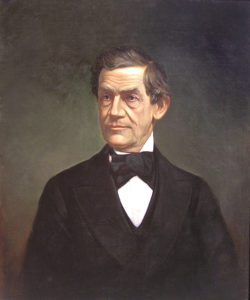Edwin T. Merrick
Edwin T. Merrick served as the chief justice of the Louisiana Supreme Court from 1855 to 1865.

Courtesy of The Law Library of Louisiana
Edwin T. Merrick. Molinary, Andres (Artist)
Edwin T. Merrick was the third chief justice of the Louisiana Supreme Court, serving from August 1, 1855, to April 1, 1865, through the turbulent years of the Civil War when the court moved twice from its headquarters in New Orleans ahead of Union occupation.
Born in Wilbraham, Massachusetts, on July 9, 1809, Merrick was the son of Thomas Merrick and Anna Brewer Merrick. The Merrick family was descended from one of the original settlers of Springfield, Massachusetts. After his father’s death Edwin was raised by his uncle, Samuel Brewer, in Springfield, New York. At age nineteen Merrick returned to Wilbraham, where he enrolled in Wesleyan Academy. After his graduation in 1832 he moved to New Lisbon, Ohio, to study law with his uncle, Alonzo L. Brewer. In 1833 he gained admission to the Ohio bar and began practicing law, first in Carrollton, Ohio, and then at the helm of his uncle’s practice in New Lisbon. He also formed a partnership with James Muse in Clinton, Louisiana, and moved there in 1838 to study Louisiana civil law. He was introduced to Caroline Elizabeth Thomas, of Cottage Hall Plantation in East Feliciana Parish, who was the stepdaughter of Merrick’s aunt, Susan Brewer. They married on December 3, 1840, and had four children.
After being admitted to the Louisiana bar, Merrick had a thriving law practice in Clinton for the next fifteen years, and he also acquired a plantation across the river in Point Coupee Parish. He was elected judge of the Seventh Judicial District in 1854, and in 1855 was elected to an eight-year term as chief justice of the supreme court. Like many of his fellow citizens in Louisiana, Merrick opposed secession but respected the will of the electors to the Secession Convention in 1860. After the capture of New Orleans by Union troops, he maintained judicial proceedings by moving the court first to Opelousas and then to Shreveport. He was re-elected as chief justice in 1863 and served until William B. Hyman was appointed chief justice of the federally controlled Supreme Court at the end of the Civil War.
Merrick returned to New Orleans after the war and fought in the courts to regain his confiscated property from the federal authorities. After receiving a pardon and readmission to the bar, Merrick practiced with the firm of Race & Foster in New Orleans. Caroline Thomas Merrick earned national recognition as an author, suffragist, and leader in the temperance movement, and Merrick supported her efforts to gain rights for women in Louisiana. Eventually, their son Edwin T. Merrick Jr. joined his father’s law practice. Another son remained in Point Coupee Parish as a planter. Merrick died on January 12, 1897, at his home in New Orleans. Although newspaper accounts of the period stated that he was to be buried temporarily at Metairie Cemetery, the location of his permanent burial place is not known.
A man of his times, Merrick was a complex amalgam of Northern ideals and Southern sympathies. He understood the importance of continuing court proceedings during wartime, and his family suffered greatly in his absence. His legal career in Louisiana spanned the period of the old Martin court to the post-Reconstruction court of Francis T. Nicholls.
